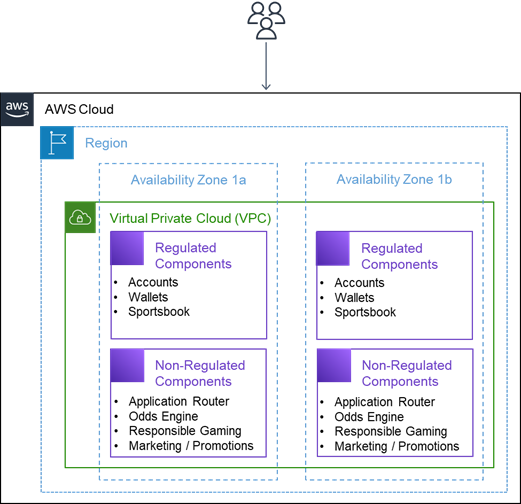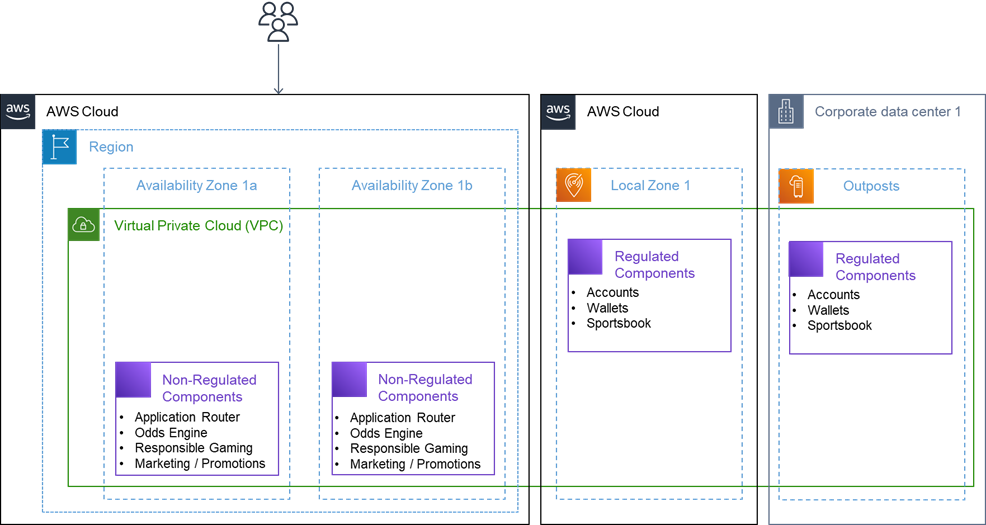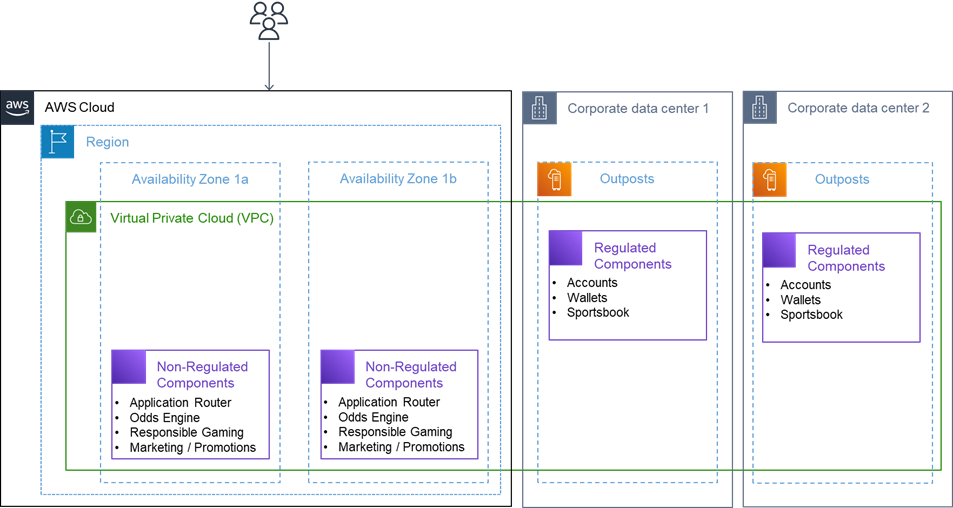Best Practices for Hosting Regulated Gaming Workloads
Best Practices for Hosting Regulated Gaming Workloads in AWS Local Zones and on AWS Outposts
Last week at Edge Computing World, Rob Czarnecki, Senior Product Manager for Hybrid Edge Solutions AWS discussed “How to leverage the cloud for every application.” In his session, Rob explored how AWS solutions like AWS Local Zones and AWS Outposts can simplify hybrid cloud migrations by bringing the AWS Cloud closer to where customers need it. This blog post takes a deep dive on another edge use case for customers: regulated workloads in real money gaming. It highlights the workload residency challenges customers encounter when deploying regulated gaming workloads and how to architect across an AWS Region, Local Zones and Outposts to address those challenges.
Regulated gaming workloads and residency requirements
A regulated gaming workload is a type of workload that’s subject to federal, state, local, or tribal laws related to the regulation of gambling and real money gaming. Examples of these workloads include sports betting, horse racing, casinos, poker, lottery, bingo, and fantasy sports. The operators provide gamers with access to these workloads through online and land-based channels, and they’re required to follow various regulations required in their jurisdiction. Some regulations define specific workload residency requirements requiring regulated workloads to be hosted within a specific city, state, province, or country. For example, in the United States, different state and tribal regulatory agencies dictate whether and where gaming operations are legal in a state and who can operate. In addition, federal legislation like the United States Federal Wire Act also constrain how regulated workloads are operated, making it illegal to facilitate bets or wagers on sporting events across state lines.
How to choose between AWS Regions, Local Zones, and Outposts for regulated gaming workloads
Using AWS edge infrastructure, specifically Local Zones and Outposts, to host a regulated gaming workload can help customers meet workload residency requirements. Local Zones place compute, storage, database, and other select services closer to large population, industry, and IT centers. Local Zones are by default connected to a parent Region via AWS’s redundant and high-bandwidth private network. Outposts is a family of fully managed solutions that deliver AWS infrastructure and services to most customer data center locations for a consistent hybrid experience. Outposts is available in various form factors, from 1U and 2U Outposts servers to 42U Outposts racks, and multiple rack deployments
First, to build and deploy a regulated gaming workload, its beneficial to separate regulated gaming workloads into regulated and non-regulated components. For example, for a sports betting workload, the regulated components might include sportsbook operation and account and wallet management, while non-regulated components might include marketing, the odds engine, and responsible gaming. In describing the following scenarios, it’s assumed that regulated and non-regulated components must be fault tolerant.
Non-regulated components of your gaming workloads are best hosted in an AWS Region. An AWS Region offers higher availability, larger scale, and a broader selection of AWS services.
For the regulated component of the workloads, choosing the type of AWS infrastructure depends on the one of three scenarios:
- Scenario one: An AWS Region is available in your jurisdiction, and local regulators have approved the use of cloud services for your regulated gaming workload.
- Scenario two: An AWS Region isn’t available in your jurisdiction, but a Local Zone is available, and local regulators have approved the use of cloud services for your regulated gaming workload.
- Scenario three: An AWS Region or Local Zone isn’t available in your jurisdiction, or local regulators haven’t approved the use of cloud services for your regulated gaming workload, but Outposts is available.
Scenario one: Use an AWS Region for regulated components
When local regulators have approved the use of cloud services for regulated gaming workloads and an AWS Region is available in your jurisdiction, consider using an AWS Region rather than a Local Zone and Outpost. For example, in the United States, the state of Ohio has announced that it will permit regulated gaming workloads to be deployed in the cloud on infrastructure located within the state when sports betting goes live in January 2023. By using the US East (Ohio) Region, operators in the state don’t need to procure and manage physical infrastructure and data center space. Instead, they can use various compute, storage, database, analytics, and AI/ML services that are readily available in the AWS Region. You can host a regulated gaming workload entirely in a single AWS Region, which includes Availability Zones (AZs)—multiple, isolated locations within each AWS Region. By deploying your workload redundantly across at least two AZs, you can help make sure of the high availability, as shown in the following figure.

Scenario two: Use a Local Zone for regulated components
A second scenario might be that local regulators have approved the use of cloud services for regulated gaming workloads, and an AWS Region isn’t available in your jurisdiction, but a Local Zone is available. In this scenario, consider using a Local Zone over Outposts. A Local Zone can support more elasticity in a more cost-effective way than Outposts. However, you might also consider using a Local Zone and Outposts together to increase availability and scalability for regulated components. Let’s consider the state of Illinois, in the United States, which allows regulated gaming workloads to be deployed in the cloud if workload residency requirements are met. Operators in this state can host regulated components in a Local Zone in Chicago, and they can also use Outposts in their data center in the same state, for high availability and disaster recovery, as shown in the following figure.

Scenario three: Use of Outposts for regulated components
When local regulators haven’t approved the use of cloud services for regulated gaming workloads or when an AWS Region or Local Zone isn’t available in your jurisdiction, you can still choose to host your regulated gaming workloads on Outposts for a consistent cloud experience, if Outposts is available in your jurisdiction. With Outposts, as part of the shared responsibility model, customers are responsible for attesting to physical security and access controls around the Outpost, as well as environmental requirements for the facility, networking, and power. Use of Outposts requires you to procure and manage the data center within the city, state, province, or country boundary (as required by local regulations) that may be suitable to host regulated components, depending on the jurisdiction. Furthermore, you should procure and configure supported network connections between Outposts and the parent AWS Region. During the Outposts ordering process, you should account for the compute and network capacity required to support the peak load and availability design.

Conclusion
If you’re building regulated gaming workloads, then you might have to follow strict workload residency and availability requirements. In this post, we’ve highlighted how Local Zones and Outposts can help you meet these workload residency requirements by bringing AWS services closer to where they’re needed. We also discussed the benefits of using AWS Regions in complement to the AWS edge infrastructure and several reliability and cost design considerations.
This content has been adapted from an original AWS blog authored by Sr. Solution Architects at AWS- Shiv Bhatt, Manthan Raval, and Pawan Matta


